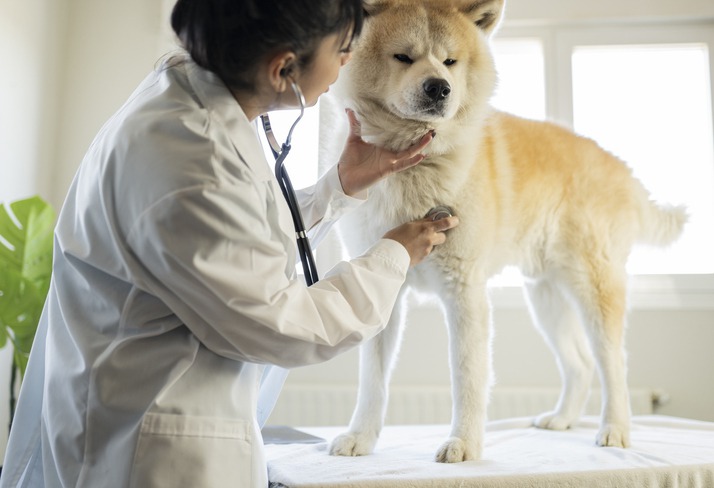How Do Wellness Exams Catch Health Issues Early in Pets?

Wellness exams are crucial in maintaining pets’ health, allowing veterinarians to detect potential health issues before they become severe. These routine check-ups involve comprehensive assessments, including physical examinations, dental checks, and blood tests. By regularly monitoring pets, veterinarians can identify abnormalities early, enabling prompt intervention and treatment. This proactive approach improves the longevity and quality of life for pets and provides peace of mind for their owners.
These routine check-ups, conducted by veterinarians, are designed to monitor your pet’s overall health and identify potential issues that may not be immediately apparent. Here’s an in-depth look at how wellness exams help catch health issues early and why this early detection is so important:
1. Thorough Physical Examinations
During a wellness exam, veterinarians conduct a comprehensive physical examination of your pet. This examination includes checking vital signs such as heart rate, respiratory rate, and temperature. Veterinarians also inspect your pet’s coat, skin, eyes, ears, mouth, and abdomen. They look for abnormalities, such as lumps, swelling, or signs of discomfort, which could indicate underlying health issues.
By carefully assessing each aspect of your pet’s physical condition, veterinarians can identify potential problems that might go unnoticed. The importance of pet wellness exams cannot be overstated, as these routine check-ups are essential for maintaining your pet’s overall health and catching issues early before they become serious.
2. Enhanced Communication
Regular wellness exams facilitate ongoing communication between you and your veterinarian. This communication is essential for identifying and addressing health issues early. By discussing any concerns you have about your pet’s health, behavior, or changes in their condition, you provide your veterinarian with important information that can aid in early detection. A strong relationship with your veterinarian ensures you receive timely advice and support for managing your pet’s health.
3. Monitoring of Chronic Conditions
For pets with pre-existing chronic conditions, such as diabetes or arthritis, regular wellness exams are essential for ongoing monitoring and management. Veterinarians can assess the effectiveness of current treatments, adjust medications, and make recommendations for managing the condition. Consistent monitoring helps prevent complications and ensure that the chronic condition remains controlled. Early adjustments to treatment plans can prevent the worsening of the condition and maintain a better quality of life for your pet.
4. Preventive Screenings and Assessments
Wellness exams include preventive screenings designed to catch potential health issues before they become serious. For example, veterinarians may perform screenings for heartworm disease, dental disease, and certain cancers. Preventive screenings can detect these conditions early, allowing for early treatment and preventing progression. By addressing potential health concerns proactively, wellness exams help to reduce the risk of developing more severe health problems.
5. Preventive Health Education
During wellness exams, veterinarians provide valuable education on preventive health care. This education includes information on proper nutrition, grooming, exercise, and preventive treatments. If you want to improve your pet’s grooming routine, you might want to find pet grooming near you. Understanding how to care for your pet proactively can help prevent health issues from developing. Preventive health education empowers you to take an active role in your pet’s well-being and supports early detection and management of potential problems.
6. Early Detection of Dental Problems
Dental health is a critical aspect of overall well-being, and regular wellness exams help to identify dental issues early. Veterinarians examine your pet’s teeth and gums for signs of dental disease, such as tartar buildup, gingivitis, or loose teeth. Dental disease can lead to serious health problems if left untreated, including infections and systemic conditions affecting the heart and kidneys. Early detection and treatment of dental issues through regular exams can prevent these complications and maintain your pet’s oral health.
7. Customized Health Plans
Wellness exams allow veterinarians to create customized health plans tailored to your pet’s needs. These plans include recommendations for vaccinations, parasite control, nutrition, and preventive treatments. Following a customized health plan ensures that your pet receives appropriate care for their age, breed, and health status. This personalized approach helps to address potential health concerns early and maintain optimal health throughout your pet’s life.
8. Routine Diagnostic Tests
Wellness exams often include routine diagnostic tests that provide valuable insights into your pet’s health. These tests, conducted at a pet laboratory in Murfreesboro, may include blood work, urinalysis, and fecal exams. Blood tests can reveal anemia, infections, liver or kidney problems, and thyroid imbalances. Urinalysis can help detect urinary tract infections, kidney disease, or diabetes. Fecal exams screen for parasites that can affect your pet’s digestive health. Regular diagnostic testing helps to identify health issues early, allowing for timely intervention and treatment.
9. Behavioral and Lifestyle Evaluations
During wellness exams, veterinarians also evaluate your pet’s behavior and lifestyle. Changes in behavior, such as increased lethargy, changes in appetite, or abnormal drinking and urination, can be early indicators of health issues. Discussing these changes with your veterinarian provides valuable information that can lead to a more accurate diagnosis. Additionally, veterinarians can offer advice on lifestyle adjustments, such as changes in diet or exercise, which can help prevent or manage health issues before they become problematic.
10. Peace of Mind
Finally, regular wellness exams offer peace of mind for pet owners. Knowing that your pet’s health is monitored regularly and potential issues are being addressed provides reassurance. This peace of mind allows you to enjoy your time with your pet without the anxiety of unknown health problems. Regular check-ups contribute to a sense of security, knowing you are taking proactive steps to ensure your pet’s health and longevity.
Final Thoughts
Wellness exams are essential in catching health issues early in pets, contributing significantly to their overall well-being. Regular veterinary visits help identify subtle changes and potential problems that might go unnoticed. Early detection through these exams ensures timely treatment, preventing more serious conditions from developing. Committing to routine wellness exams ensures pets lead healthier, happier lives.


